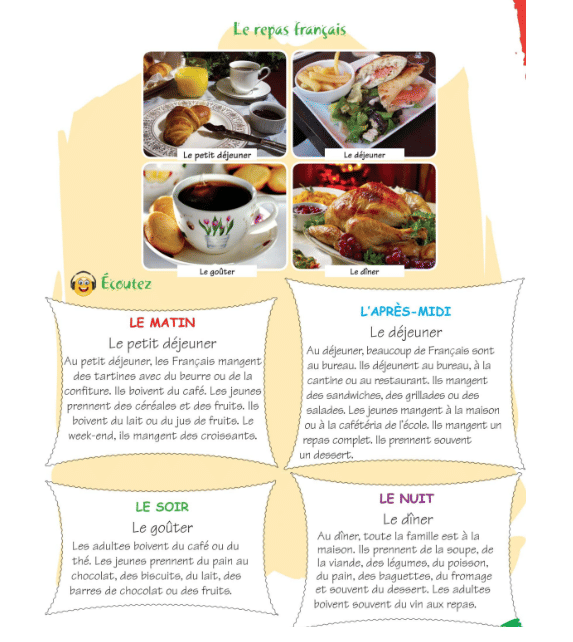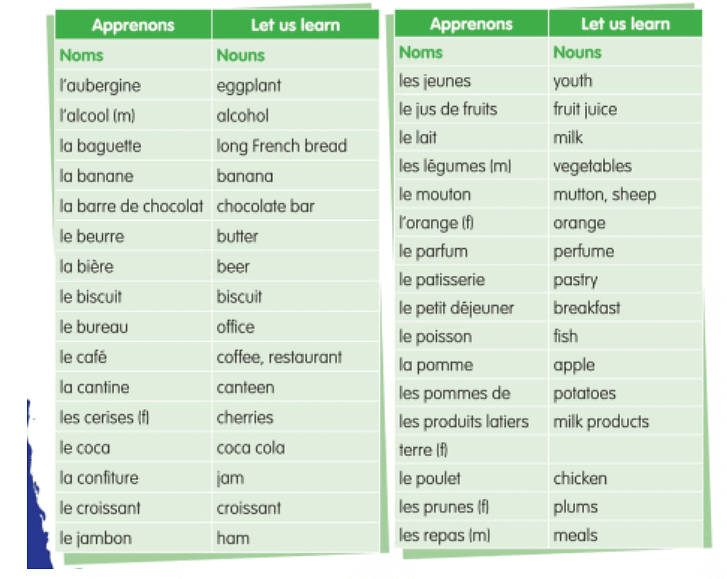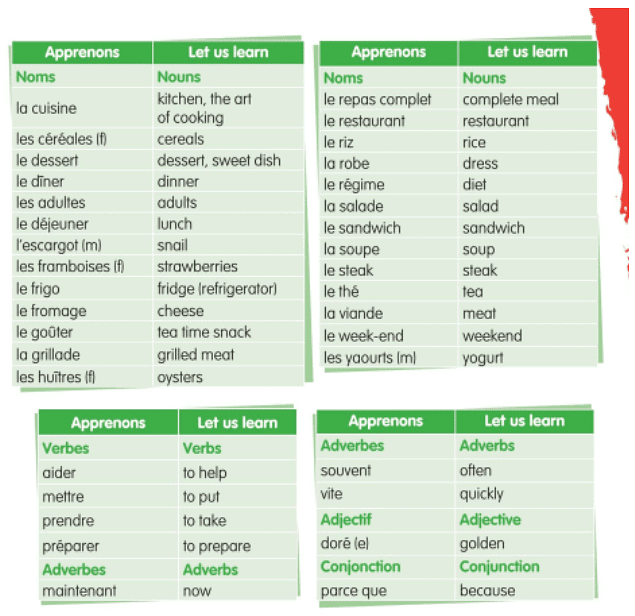Les repas (Meals) Chapter Notes | French for Class 6 PDF Download
Les repas (Meals)
Manuel: Maman, est-ce que tu fais un gâteau?
(Mah-mahn, ehs-kuh tu feh un ga-toh?)
(Mom, are you making a cake?)Mme Lavigne: Oui, je fais un gâteau au chocolat et des crêpes.
(Wee, zhuh feh un ga-toh oh sho-ko-la eh dey krep.)
(Yes, I am making a chocolate cake and crepes.)Manuel: Aneesh aime les crêpes. Il mange souvent des crêpes au petit déjeuner.
(Ah-neesh em lay krep. Eel mahnj soo-vahn dey krep oh puh-tee dey-zhuh-nay.)
(Aneesh likes crepes. He often eats crepes for breakfast.)Mme Lavigne: Qu'est-ce que vous buvez?
(Kehs-kuh voo boo-vay?)
(What are you drinking?)Manuel: Je bois du coca. Aneesh déteste le coca. Il aime le jus de fruits.
(Zhuh bwah du ko-ka. Ah-neesh dey-test luh ko-ka. Eel em luh zhoo deh frwee.)
(I am drinking cola. Aneesh hates cola. He likes fruit juice.)Mme Lavigne: Bon, je mets du jus de fruits dans le frigo. Maintenant, tu mets le couvert.
(Bon, zhuh meh du zhoo deh frwee dan luh free-go. Mehn-tnahn, too meh luh koo-vehr.)
(Well, I'll put some fruit juice in the fridge. Now, you set the table.)
Les articles partitifs (Partitive Articles)
- Formation des articles partitifs:
de + article défini → article partitif- de + le → Du (before masculine singular nouns)
Exemple: Il achète du pain. (He buys some bread.) - de + la → de la (before feminine singular nouns)
Exemple: Il achète de la confiture. (He buys some jam.) - de + l' → de l' (before masculine and feminine singular nouns beginning with a vowel or silent h)
Exemple: Il achète de l'eau. (He buys some water.)
Exemple: Il achète de l'aubergine. (He buys some eggplant.) - de + les → des (before masculine and feminine plural nouns)
Exemple: Il achète des biscuits. (He buys some cookies.)
- de + le → Du (before masculine singular nouns)
L'article défini ou l'article partitif? (The definite article or the partitive article?)
We use the partitive articles only to denote an imprecise quantity, i.e., some. When we are talking in the general sense or about a precise quantity, we use the definite articles.
- Exemples:
- J'aime le thé et il préfère le café. (I like tea and he prefers coffee.)
- Elle aime le chocolat mais elle déteste les légumes. (She likes chocolates but she dislikes vegetables.)
- Voilà des chocolats, j'achète le chocolat noir. (Here are some chocolates, I am buying the dark chocolate.)
- Voilà le gâteau d'anniversaire, voulez-vous du gâteau? (Here is the birthday cake, do you want some cake?)
- Exemples:
La négation avec l'article partitif (Negation with partitive article)
Like the indefinite articles un, une, des, the partitive articles also become de or d' in the negative.
- Exemples:
- Je veux du gâteau. (I want some cake.)
- Je ne veux pas de gâteau. (I do not want any cake.)
- Elle mange de la viande. (She eats some meat.)
- Elle ne mange pas de viande. (She does not eat any meat.)
- Vous achetez des robes. (You buy some dresses.)
- Vous n'achetez pas de robes. (You do not buy any dresses.)
- Exemples:
Conjugation of verb "sortir" (to go out)

Other verbs conjugated like sortir: partir (to leave), sentir (to smell, to feel), mentir (to lie)
Present tense of verb - 'boire' (to drink)

Note: The radical of Nous and Vous form is bu.

|
17 videos|44 docs
|
FAQs on Les repas (Meals) Chapter Notes - French for Class 6
| 1. What are the different meals discussed in the article? |  |
| 2. What is the difference between definite articles and partitive articles in French? |  |
| 3. How do you use partitive articles in negation in French? |  |
| 4. How do you conjugate the verb "sortir" (to go out) in French? |  |
| 5. What is the present tense of the verb "boire" (to drink) in French? |  |





















